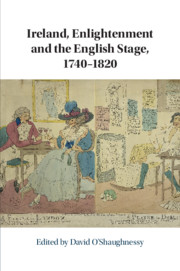Book contents
- Ireland, Enlightenment and the English Stage, 1740–1820
- Ireland, Enlightenment and the English Stage, 1740–1820
- Copyright page
- Contents
- Illustrations
- Tables
- Contributors
- Acknowledgements
- Introduction Staging an Irish Enlightenment
- Part I Representations and Resistance
- Part II Symbiotic Stages: Dublin and London
- Part III Enlightened Perspectives
- Select Bibliography
- Index
Part III - Enlightened Perspectives
Published online by Cambridge University Press: 22 July 2019
- Ireland, Enlightenment and the English Stage, 1740–1820
- Ireland, Enlightenment and the English Stage, 1740–1820
- Copyright page
- Contents
- Illustrations
- Tables
- Contributors
- Acknowledgements
- Introduction Staging an Irish Enlightenment
- Part I Representations and Resistance
- Part II Symbiotic Stages: Dublin and London
- Part III Enlightened Perspectives
- Select Bibliography
- Index
Summary
Macklin’s Henry the VII (1746) has received little critical attention. This chapter reads the play as part of a tradition of Irish history plays that were influenced by Joseph Addison’s Cato (1713). Addison’s themes of personal self-sacrifice, love of country and resistance to tyranny proved inspirational for Irish dramatists in the wake of the Declaratory Act (1720) as can be seen in William Philips’s Hibernia Freed (1722) and Henry Brooke’s Gustavus Vasa (1739). History plays then might offer an alternative genealogy of eighteenth-century Irish theatre which is often focused on comedies.
Keywords
- Type
- Chapter
- Information
- Ireland, Enlightenment and the English Stage, 1740-1820 , pp. 165 - 248Publisher: Cambridge University PressPrint publication year: 2019

